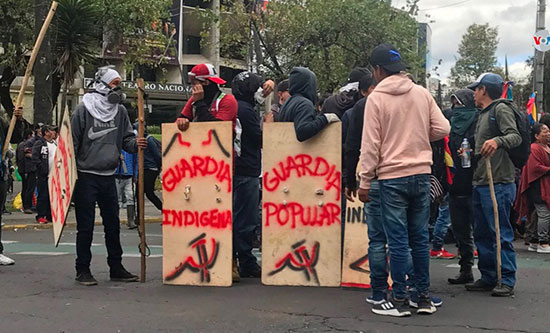
From 3 October workers and indigenous communities rose up against President Lenin Moreno’s economic assault. For 12 days, Ecuador witnessed extensive repression by state forces. Official numbers show 11 dead, 1,340 wounded and 1,192 arrested – 96 of them under 15 years of age. 80% of detentions were arbitrary and illegal. There is no data on missing persons. Armed forces used live rounds, grenades and tear gas. Citizens have denounced torture, illegal detentions and trials in military buildings. Alvaro Michaels reports.
Taking office in May 2017, Moreno split the ruling Alianza Pais party and has subverted democratic institutions, persecuted opponents and reinstated neoliberal economic policies, removing gains made by workers during ex-President Correa’s government. Moreno’s constituency is big business, the right-wing, private media and the US government.
Falling oil prices challenged the government. Threatened with exclusion from borrowing in international capital markets, Moreno chose to make the poor pay rather than increase taxes on the wealthy. In 2018 he took up the offer of a $4.2bn IMF loan and on 2 October 2019 announced conditions for its acceptance. He aimed to eliminate a fuel subsidy, raise taxes, remove labour protections and cut public spending. These cuts amount to $2bn per year. To do this Moreno bypassed the National Assembly and the Constitutional Court, violating the constitution. In 2019 a total of $10bn credits were negotiated by Moreno with different financial institutions. The US is deeply involved in this. The permission to use the Galapagos Islands as a US military airfield, the surrender of Julian Assange from the Ecuadorian embassy in London and the IMF agreement were all directed by Washington.
The removal of fuel subsidies sent prices soaring, with costs of some products – papayas, rural bus fares – more than doubling. On 3 October transport workers launched a nationwide strike, joined by several indigenous movements, marching to the capital Quito to support the strike and reject the cuts. Within hours of the protests starting Moreno decreed martial law, suspending civil rights and allowing military deployment. The military arrested transport union leaders, forcing an agreement to suspend the strike two days later.
However, thousands of indigenous people had marched to Quito from across the country, occupying the city, with enthusiastic solidarity from local workers and students. Protesters clashed with security forces for days around the presidential palace and National Assembly. Indigenous protesters attacked Amazon oil wells, cutting off generators and forcing essential staff to leave. Production of Ecuador’s main export was paralysed. Across the country protesters captured and paraded dozens of police officers. Minister of Defence Jarrín warned on national television that the armed forces would use lethal weapons. Traditional media outlets blatantly censored news. The blackout was near complete. Public radio, Pichincha Universal, was accused of inciting unrest, pulled off-air and its equipment confiscated. The government tried to disrupt the mobile internet at crucial moments of the mobilisations.
Desperate, Moreno accused former President Correa, Venezuela’s President Maduro, Colombia’s ELN and FARC and the Latin Kings, a former gang, now a legal cultural group, of promoting the demonstrations and attempting to overthrow the government. Anti-Correa propaganda was carried on nationwide broadcasts. In Quito protesters briefly occupied the National Assembly on 8 October, before security forces removed them. Moreno’s government fled from Quito to Guayaquil, imposing a night-time curfew around key state buildings. As protests continued further curfews were imposed and defied.
On the night of 11 October, explosions around the El Arbolito park, where the vast majority of protesters gathered, were heard all over northern Quito. The next morning protests took place in all neighbourhoods, panicking the government into calling a curfew at 3pm. The protesters defied the measure; state violence increased. Protesters were shot at and some reported the presence of snipers. The broadcaster Telesur’s signal was cut off on 12 October. On 13 October the attempt to eliminate fuel subsidies was scrapped in talks with the indigenous leaders under cover of UN mediation, but most of the austerity measures in the new economic package, such as reduced public sector holidays from 30 to 15 days, reduced salaries and weakened labour protection remain. Martial law was lifted on 14 October. Since then Paola Pabón, governor of the province of Pichincha, and two assistants were arrested without warrant and accused of supporting armed rebellion. The same charges have been made against former congressman Virgilio Hernández. Seven political figures in the opposition, including former President of the Assembly Gabriela Rivadeneira, took refuge in the Mexican embassy.
On 17 November Ecuador’s National Assembly rejected the package of $700m tax increases and monetary measures, called the ‘economic growth bill’, by 70 of 133 votes. Its 400 articles included issues from student debt to mining policy and central bank autonomy. Former President Correa called it a ‘looting bill’. Ecuador’s dollar bond fell for the ninth successive day so that a 2028 dollar bond sank to 77 cents on the New York market. Investors now demand an 11.06% return to hold the country’s debt. Moreno is seeking new loans to repay debt that is becoming due. Renewed clashes between the imperialists, their placemen and the masses are imminent. The next presidential and legislative elections are scheduled for 2021.
Fight Racism! Fight Imperialism! 273 December 2019/January 2020




